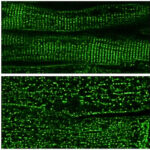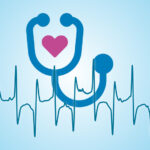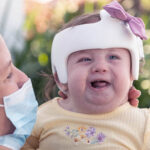Kiersten finds new purpose after care for life-threatening cardiomyopathy
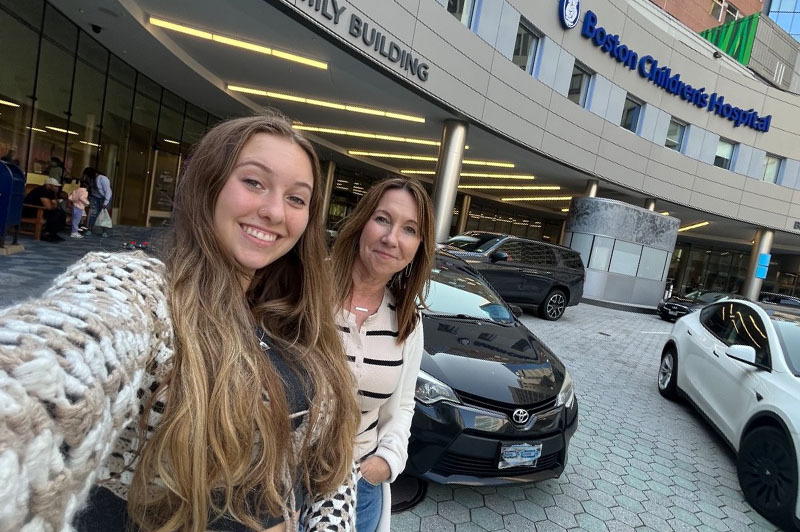
Being just three miles away from her cardiac care team at Boston Children’s makes all the difference in the world to New Jersey native Kiersten Rock-Torcivia as she starts her sophomore year at Boston College. She is now closer to the specialists who help her manage a rare and life-threatening cardiomyopathy.
Kiersten initially believed she would face a lifetime of restrictions to prevent the recurrence of a heart rhythm disorder that could again make her heart rapidly beat at a dangerous pace. But after receiving care from Boston Children’s heart specialists, Kiersten now safely exercises and has the proper medication to treat her chest pains.
“Being here in Boston, I have all these great opportunities to help me progress and give me more confidence to approach everyday life,” she says.
A sudden cardiac event pauses her figure skating
From ages 6 to 15, Kiersten’s life centered on competitive synchronized figure skating. A practice in 2019 initially seemed like any other, but as she went through her routine on the ice, her heart started racing and her vision faded. She was rushed to a nearby hospital, where her heart rate was recorded at a life-threatening 283. “It’s a miracle she didn’t have cardiac arrest that day,” her mother, Deirdre, says.
After months of appointments, Kiersten’s doctors thought she had a type of arrhythmia that could be treated with a catheterization procedure known as an ablation. But she went into cardiac arrest during the procedure, leading her doctors to recommend Boston Children’s for further diagnosis and pausing her figure-skating pursuits.
“This was all shocking. The ablation was supposed to be successful, and she was going to be back on the ice the following week. She was in a huge competition,” Deirdre recalls. “It never crossed our minds that it would turn out to be something else.”
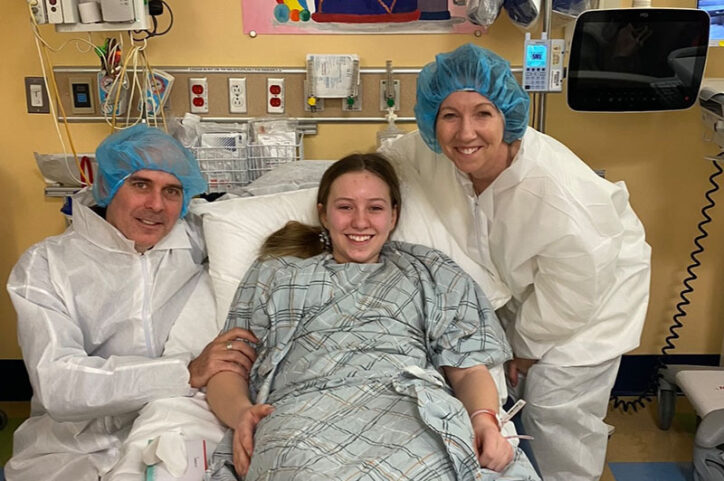
Treatment for a rare genetic cardiomyopathy
Deirdre and her husband, Rob, reached out to Boston Children’s in spring 2020 and had to send test results to the hospital because COVID-19 restrictions prevented the family from traveling there. Dr. Dominic Abrams, co-director of Boston Children’s Center for Cardiovascular Genetics, called to inform them that Kiersten has arrhythmogenic cardiomyopathy. It’s a rare genetic condition associated with life-threatening arrhythmia and the progression to heart failure. Kiersten has a type that affects the right ventricle: arrhythmogenic right ventricular cardiomyopathy (ARVC).
“Dr. Abrams has been amazing from the start,” Deirdre says. “He gave us time to absorb the diagnosis, and then a week later, we had a Zoom call with him, nurses assistants, a psychologist, and others. They walked us through the condition, educating us and letting us know what to expect. We were able to share that with our extended family because there is a genetic component.”
With the new diagnosis from Boston Children’s, a hospital close to Kiersten’s home placed an implantable cardioverter-defibrillator (ICD). If the ICD detects a ventricular arrhythmia, it will deliver a therapy to restore her heart rhythm to normal. It’s a key element to treatment, but Kiersten knew she would also benefit from more specialized care as she started to manage ARVC on her own. She had applied to colleges near major hospitals, and was thrilled when she was accepted to Boston College, just a short ride away from Boston Children’s.
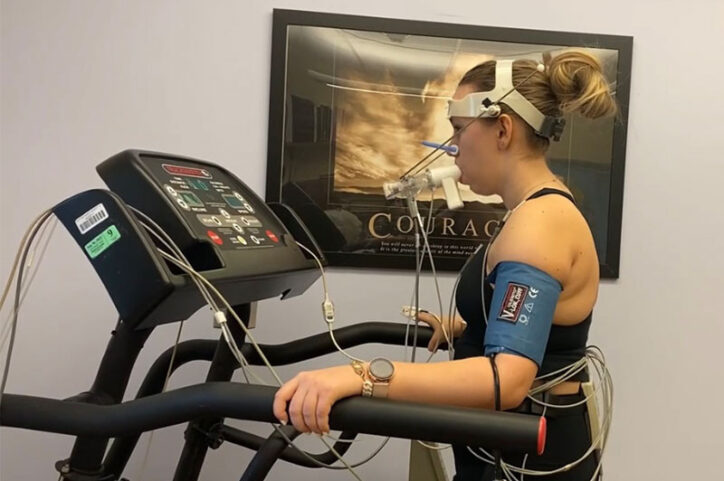
Finding complete support at Boston Children’s
Finally able to visit Boston Children’s in person, Kiersten regularly sees Dr. Abrams. She also has appointments with the Chronic Pain Clinic, which is part of the Pain Treatment Center.
“I had been on maybe six different medications for random chest pains, and nothing was working,” Kiersten says. Dr. Abrams and colleagues determined she had myocardial inflammation, which is recognized as being part of arrhythmogenic cardiomyopathy but is not well understood. “When I came to the clinic, the first thing they tried was perfect. I’m still on that medication.”
Kiersten has also benefited from regular monitored exercise at the Cardiac Fitness Program. “Exercising can make me anxious because of my heart rate getting high. But the exercise physiologists are fun, kind, and supportive. We talk about Taylor Swift and other things to keep my mind occupied, and they encourage me to keep going. I’m really excited to be a part of the program.”
She appreciates how her care team has always included her in conversations about her health. “They knew I would have to someday handle this on my own, and I found that valuable. It has made me feel more comfortable now that I’m 19 and going to my appointments alone.”
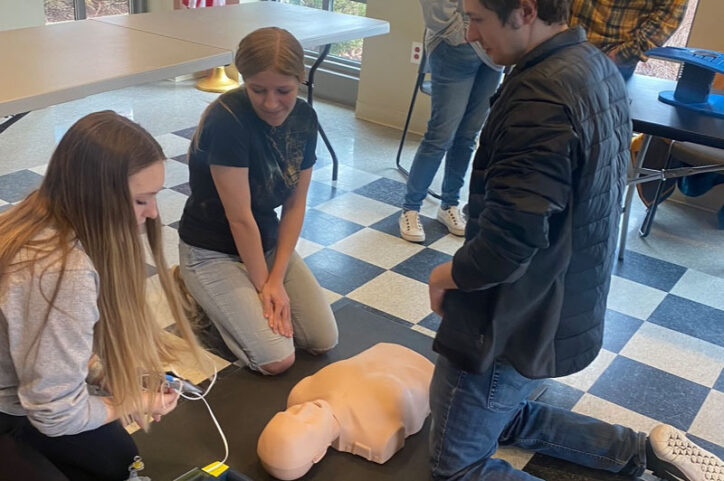
Giving back after getting a second chance
Kiersten also appreciates how Dr. Abrams and her doctors back home tried to put her in a position so she could resume competitive skating. But despite trying different medications, she still experienced arrhythmias on the ice. She was sad watching her teammates compete without her, but soon found a new passion: advocating heart care. Kiersten founded the charity Heartfelt Harmonies. It has donated 20 AEDs to organizations to support socioeconomically-challenged areas.
“In the beginning I was kind of upset and would ask, ‘Why did this happen to me?’ But as time went on, I got more of a grip on things and realized I am lucky to be here. I now want to do all I can to help others.”
She also wants to give back in her future career. Kiersten’s experiences as a cardiac patient pulled her into the study of health care; she is pursuing a bachelor’s degree in nursing at Boston College, with the hope of becoming a nurse practitioner, probably in cardiology. “My journey will hopefully help me connect to patients and relate to them, and I can give them that support when they most need it.”
Learn more about the Center for Cardiovascular Genetics or schedule an appointment.
Related Posts :
-

Ava’s journey with arrhythmogenic cardiomyopathy
Claire Poole never thought a 10-year-old could have a heart condition. So when her daughter, Ava, slumped against the wall ...
-

Shoring up heart muscle's mini 'managers' to treat heart failure
Our heart muscle is studded with tiny dyads, intricately designed structures that manage incoming electrical signals and calcium release to ...
-

Finding a possible genetic treatment for rare arrhythmias
Variants in a gene that plays a key role in heart function can cause potentially life-threatening arrhythmia syndromes known as ...
-

With support for genetic condition trisomy 18, Brooklyn ‘tells her own story’
Erin and Tim Haggan quickly realized they would always be seeking answers after learning the child they were expecting had&...



